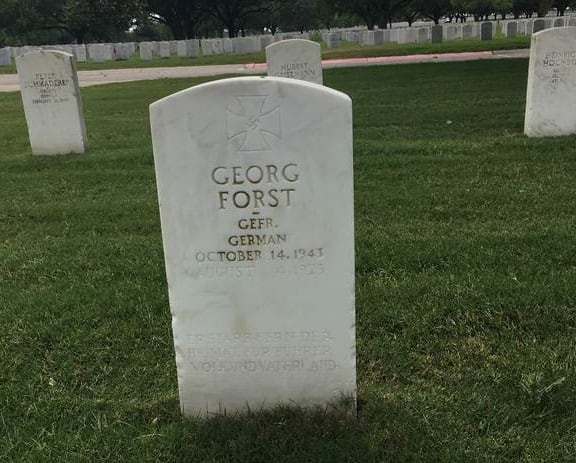Veterans Affairs officials announced Monday they will remove a series of of grave markers bearing Nazi swastikas and tributes to Adolf Hitler from department cemeteries after lawmakers and veterans advocates complained the markers were offensive and disrespectful.
The move represents a turnaround from last week, when VA Secretary Robert Wilkie said he was looking for ways to put the problematic grave markers “in historical context” rather than remove them from the cemeteries.
But critics said any result that left the controversial symbols alongside the graves of American war heroes was insufficient. After about two weeks of controversy, VA officials relented.
“It is understandably upsetting to our veterans and their families to see Nazi inscriptions near those who gave their lives for this nation,” Wilkie said in a statement Monday. “That’s why VA will initiate the process required to replace these POW headstones.”
RELATED

At issue are three grave sites at two VA cemeteries: Fort Sam Houston National Cemetery in Texas and Fort Douglas Post Cemetery in Utah.
Both were used to inter dozens of unclaimed remains of enemy troops following World War II. The sites were administered by the Army for decades until responsibilities were transferred to VA’s National Cemetery Administration.
While most of the foreign troops’ grave markers list only names and dates of death, the three in question— which all date back to the 1940s — are also engraved with a swastika in the center of an iron cross and inscription in German which reads “He died far from his home for the Führer, people and fatherland.”
Earlier this month, following complaints from local veterans about the offensive messages, leaders from the Military Religious Freedom Foundation demanded VA remove the grave markers, saying their presence alongside American veterans was unforgivable.
But VA leaders have said that the sites are governed by the National Historic Preservation Act of 1966, which “assigns stewardship responsibilities to federal agencies, including VA and Army, to protect historic resources, including those that recognize divisive historical figures or events.”
Last week, in testimony before the House Appropriations Committee, Wilkie said the law prohibited him from simply removing the stones, but he also argued that doing so would amount to ignoring history.
“I happen to think that making sure when people visit our cemeteries they are informed of that horror is an important thing to do … erasing these headstones removes them from memory,” he said.
Rep. Debbie Wasserman Schultz, D-Fla., and a vocal critic of Wilkie’s initial decision, accused VA leadership of “hiding behind” the law instead of taking proper action.
RELATED

VA officials on Monday did not give a date for removal of the grave stones, saying that under the NHPA that “ VA is not permitted to unilaterally remove them or alter them.”
Department leaders did promise that later this month staff will “will begin taking required steps … about how to replace these headstones with historically accurate markers that do not include the Nazi swastika and German text.”
Officials do not plan to dispose of the headstones, but instead store them in the National Cemetery Administration History Collection.
VA will also install signs at all VA national cemeteries where foreign enemy prisoners of war are buried “in order to provide historical context about how non-U.S. service members from World War I and World War II were interred and buried on American soil.”
Wilkie said that despite the change, “Americans must always remember the horror of the Nazi regime and why so many Americans sacrificed so much to free the world from its reign of terror.”
Leo covers Congress, Veterans Affairs and the White House for Military Times. He has covered Washington, D.C. since 2004, focusing on military personnel and veterans policies. His work has earned numerous honors, including a 2009 Polk award, a 2010 National Headliner Award, the IAVA Leadership in Journalism award and the VFW News Media award.



